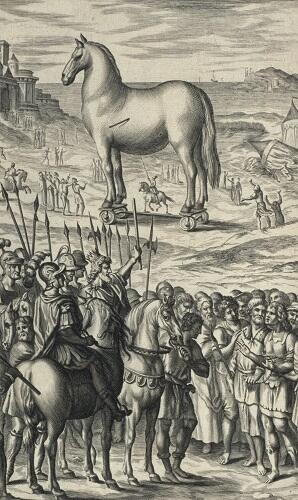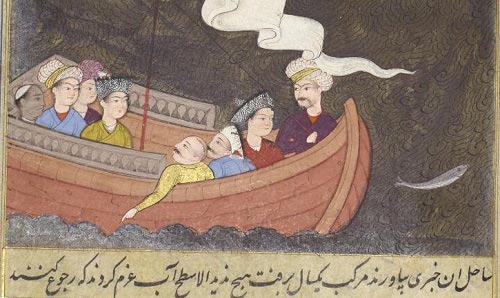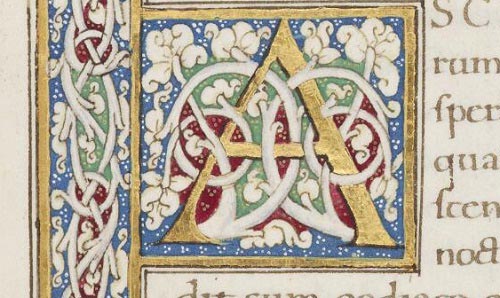
Classics and Ancient History Collections
The Library’s Special Collections are home to an extensive and diverse collection of materials invaluable for the study of Classics and Ancient History.

From thousands of ancient papyrus and parchment fragments, through the earliest printed editions of all the major classical texts, to the archives of modern classical and Near Eastern scholars, this guide provides an overview of the main collection strengths and offers details on accessing the most relevant materials for research and learning.
The Library holds extensive collections of material from the ancient world, including over 1,100 items written in Sumerian and Akkadian cuneiform scripts, and an internationally significant collection of Egyptian papyri, comprising some 2,000 fragments dating from the 3rd century BCE to the 9th century CE and written in Hieratic, Demotic, Greek, Hebrew, Coptic, Latin, and Arabic.
There is an outstanding collection of Medieval and Renaissance Latin manuscripts that reflect the revival of classical learning during the Renaissance, alongside one of the world’s most important collections of early printed editions of classical literature, with first editions of fifty principal Greek and Latin authors. There is an exceptional array of books and archives related to the Classical Revival from the 15th century onwards, while the archives of several learned societies and the papers of individual academics are important sources for the historiography of the ancient world.
Cuneiform
The Rylands holds an extensive Cuneiform collection that includes over 1,100 items written in Sumerian and Akkadian cuneiform scripts, dating from the 25th to the 4th centuries BCE. Primarily originating from the temples of Drehem and Umma, the majority of the tablets are dated to the Ur III dynasty (22nd–21st centuries BCE). The collection also features fragments from the First Babylonian Dynasty (20th–17th centuries BCE) and later Babylonian and Assyrian periods.
This collection comprises a variety of genre, two bricks of Nebuchadnezzar II commemorating the rebuilding of the temple of Shamash at Sippar (Cuneiform 1092 and 1093), a nail of Enlil-bani celebrating the stronghold of Isin (Cuneiform 1094), and two cylinders of Nebuchadnezzar II documenting the rebuilding of temples at Sippar and Maras, including royal inscriptions, letters, and economic, administrative, and agricultural documents, along with literary texts. Highlights include a rare plan of a Sumerian temple (Cuneiform 930), a tablet about Gilgamesh's conquest of Kish (Cuneiform 931)d (Cuneiform 1095 and 1096).
The entire collection has been digitised and is available to search via the Cuneiform Digital Library Initiative (CDLI).
Papyrus and parchment collections
The Rylands holds an internationally significant collection of Egyptian papyri, comprising some 2,000 fragments ranging in date from the 3rd century BCE to the 9th century CE, and written in Hieratic, Demotic, Greek, Hebrew, Coptic, Latin, and Arabic. This collection includes a number of important Hieratic and Demotic works, including Demotic 9, the Petition of Peteêsi; classical texts of Greek and Latin literary works, including plays, poems, and philosophical writings; biblical, liturgical texts, and other important religious works that offer insights into early Christian and Jewish practices, including the famous Gospel of John fragment (i.e. P52); medical texts detailing ancient medical knowledge and practices; documentary papyri such as business papers, public records, local government files, taxation documents, and financial memoranda, including the noted Theophanes Archive; and finally, the Ronald Reed Archive contains dozens of Dead Sea scrolls fragments that were instrumental in early research on the dating of the scrolls.
In addition to the 800 published papyrus works, there are approximately 1,200 unpublished pieces, offering further research potential.
Medieval and Renaissance manuscript collections
The Library holds an outstanding collection of Medieval and Renaissance Latin manuscripts that reflect the revival of classical learning during the Renaissance and remain essential for the study of classical antiquity. Highlights include several texts of Aristotle, Cicero, Lucretius, and Virgil.
Mention must also be made of the Library’s Armenian, Coptic, Ethiopic, Greek, Hebrew, and Syriac manuscript collections. Armenian MS 20, a richly illustrated 16th-century Romance of Alexander, is particularly worth noting. The collection contains an equally important selection of Arabic Manuscripts, which showcase the preservation and dissemination of classical texts by Arabic scholars during the early Middle Ages, including translations and original works influenced by Greek thought.
Printed editions of classical literature
The Rylands features one of the world’s most important collections of early printed editions of classical literature. We hold first editions of fifty leading Greek and Latin authors, including a copy of the first ancient text printed in Greek, Aesop’s Fables, printed in Milan by Bonus Accursius around 1478. The Homeric epics are represented by the first printing of Nicolaus de Valle’s Latin translation (Rome, 1474); the first edition in the original Greek (Florence, 1488); and an illuminated vellum copy of the Aldine edition of 1504.
Few people made a greater contribution to the revival of classical scholarship than Aldus Manutius, whose Venetian press issued almost thirty editiones principes in the original Greek. The Library holds the vast majority of these, including Aristotle (1495–8), Theocritus (1496), Aristophanes (1498), Thucydides (1502), Sophocles (1502), Herodotus (1502), Demosthenes (1504), Plato (1513), Aeschylus (1518), and Hippocrates (1526).
Of Roman authors, Cicero is represented by 75 editions before 1501; there are no less than 22 editions of Virgil printed before 1480; and we hold 800 editions, translations and commentaries of Horace, beginning with the Venetian edition of 1471/2.
The Library also holds extensive collections of works published in the Loeb and Teubner series of classical texts.
The Classical Revival
Our collection comprises an exceptional array of books and archives related to the Classical Revival from the 15th century onwards. In addition to the previously mentioned editions of classical texts, the collection includes significant architectural volumes that illustrate the influence of classical design on figures such as Leon Battista Alberti, Colen Campbell, Christopher Wren, Robert Adam, and John Soane. Likewise, Sir William Hamilton’s Campi Phlegraei and a complete set of Piranesi’s engravings underscore the impact of classicism on both fine and applied arts.
Diaries and letters within estate archives reveal the importance of the Grand Tour and of actual encounters with the remnants of classical antiquity in shaping attitudes towards the ancient world.
Archives of academics and related professional societies
The archives of the Manchester Egyptian and Oriental Society document the society's activities and research since its founding in 1906. This collection includes letters exchanged between society members and other scholars, providing a glimpse into the collaborative efforts and communications within the academic community, as well as meeting minutes, research notes and publications, contributing valuable research and findings to the fields of Egyptology and Near Eastern studies.
Similarly, the archives of the Manchester Classical Association preserve the history and activities of an organization dedicated to the promotion of classical studies. These archives include administrative records and correspondence between members of the association and other classical scholars, as well as publications and newsletters produced by the association, which disseminated information about classical studies and the association's activities to its members and the wider public.
We also hold the archives of individual academics such as Edward Freeman (1823–1892), John Strachan (1862–1907), William Hugh Brownlee (1917–1983), Eve Reymond (1923–1986), and John Allegro (1923–1988).
List of collections
Physical collections
- Arabic Manuscripts
- Armenian Manuscripts
- Architectural Printed Works
- Bible Collection
- Classical Literature
- Coptic Manuscripts
- Crawford Collection
- Cuneiform Tablets
- Ethiopic Manuscripts
- Egyptian Manuscripts
- Edward Freeman Papers
- Moses Gaster Collection
- Moses Gaster Manuscripts Collection
- Greek Manuscripts
- Hebrew Manuscripts
- Incunabula Collection
- Latin Manuscripts
- Manchester Classical Association, Excavations Committee Records
- Manchester Egyptian and Oriental Society Archive
- Persian Manuscripts
- Eve Reymond Papers
- John Rylands Library Archive
- Samaritan Manuscripts
- Spencer Collection
- John Strachan Book Collection
- John Strachan Papers
- Syriac Manuscripts
- Turkish Manuscripts
Digital collections
- Cuneiform Digital Library Initiative (CDLI)
- Gaster Amulets in Manchester Digital Collections
- Golden Mummies of Egypt in Manchester Digital Collections
- Hebrew Manuscripts in Manchester Digital Collections
- Latin Manuscripts in Manchester Digital Collections
- Persian Manuscripts in Manchester Digital Collections
- Syriac Manuscripts in Manchester Digital Collections
Further information

Exploring subject areas
An overview of our Special Collections, including information about the background and history of our holdings.

Special Collections A-Z
Explore the Special Collections through the collection names and descriptions using our searchable A-Z tool.
